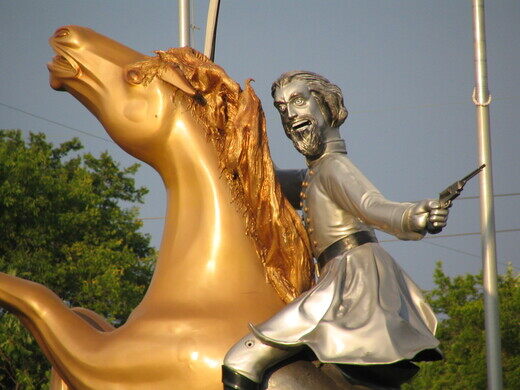Indeed, if anything, any memorial to the USSR is vastly worse than those about the confederacy. The confederates desired to continue to enslave a portion of the human species and failed to do it. The soviets desired to rule with an iron fist over all of humanity and crush all those opposed, and succeeded on a large scale. Purely on a utilitarian results based criteria the USSR was much much much worse for humanity than the confederacy was.
That line of reasoning may hold water in Eastern Europe - as they were certainly conquered by the USSR - but I would suggest that Russians would have a very, very different view of the USSR and that the "iron fist over humanity" narrative is one that is to a large extent a Cold War propaganda creation.
Indeed, it kinda goes right against the whole "Communism in one country" route that Stalin took as opposed to the international communist movement many communist ideologues desired; and conveniently ignores that it was Winston Churchill (without consultation with the United States) who agreed that the Soviets could take over Eastern Europe in the aftermath of WW2 and then turned right around and demonized them for it.
History, again, is awfully complicated in reality. One nation's hero is another's villain.
The problem is when people try to pretend that exploring these complications is the equivalent of justifying bad actions. In reality most leaders and nations do both good and bad; and that attempting to portray only the good and bad of one side is often little more than self-serving propaganda. Churchill certainly was a master at this, and to a large extent the English-language historical establishment unfortunately has a tendency to follow his lead especially when it comes to the questions of power politics and empire. This is why the Ukrainian famine became a popular cited incident on the Internet whenever Soviet imperialism is brought up, whereas the Bengal famine (or the earlier Irish famine) is almost never brought up when British imperialism is discussed.
This is why I proposed that a good memorial - particularly one tackling a difficult topic like a civil war - should not be designed to invoke pride or comfort. It should reflect the actual complexities of what it is memorializing.
And note that this not mean adding an overly long thesis to war memorials exploring its many sides.
There are for instance few memorials more simple and honest than the French war memorials for the dead of the First World War - found in cathedrals which simply lists the men in the town who died during the conflict (with multiple same surnames indicating multiple deaths in a single family) under the words Mort pour la France. Nationalists for instance may point to such memorials to justify present policy in defense of the nation, just as pacifists can point to it to demonstrate the horror and pointlessness of war. It is not meant to invoke just positive emotions and make people feel bigger.
By contrast Confederate memorials are consistently one-sided depictions to glorify the Confederacy. That so many of them feature Robert E. Lee - riding a horse as a general - is particularly galling given that Lee himself was against being memorialized, presciently noting that such monuments would only to continue to engender the feelings that caused the terrible war in the first place. One is almost tempted to see how the pro-Confederate "heritage" arguers would react if someone would raise a monument of Lee - not as a soldier - but as a postwar private citizen who said words like these:
"It should be the object of all to avoid controversy, to allay passion, give full scope to reason and to every kindly feeling. By doing this and encouraging our citizens to engage in the duties of life with all their heart and mind, with a determination not to be turned aside by thoughts of the past and fears of the future, our country will not only be restored in material prosperity, but will be advanced in science, in virtue and in religion".
Compared to the military triumphalism intended for his (now-removed) "monument" in New Orleans:
"In Tivoli Circle, New Orleans, from the centre and apex of its green flowery mound, an immense column of pure white marble rises in the ... majesty of Grecian proportions high up above the city's house-tops into the dazzling sunshine ... On its dizzy top stands the bronze figure of one of the world's greatest captains. He is alone. Not one of his mighty lieutenants stand behind, beside or below him. His arms are folded on that breast that never knew fear, and his calm, dauntless gaze meets the morning sun as it rises, like the new prosperity of the land he loved and served so masterly, above the far distant battle fields where so many thousands of his gray veterans lie in the sleep of fallen heroes. (Silent South, 1885, The Century Illustrated Monthly Magazine)"
Last edited:


